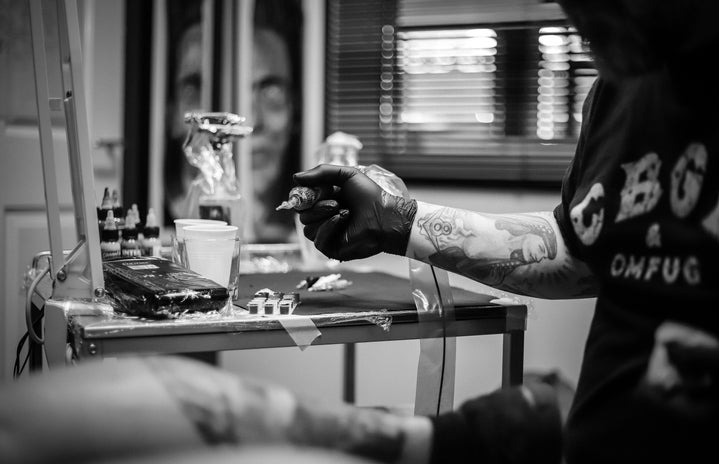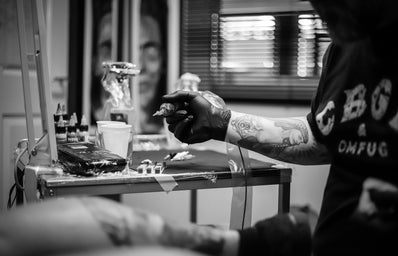Tattoos, they’re like a permanent sticker. A lot of people have them, and many people have at least thought about getting one. There’s a certain allure to getting a tattoo, a few tattoos, or enough tattoos to cover every inch of your skin. With the stigma against tattoos decreasing more and more, more and more people are considering getting one — some for the first time ever. If you are one of those people, then this article is here to give you all the information you need to know and take into consideration before getting your first tattoo.
The first thing you need to have in mind is what you want your tattoo to be. You should probably have a specific design, or at least a specific concept in mind before you go in for your consultation — unless you want to put the appearance of your first tattoo solely in the hands of your artist and their creative vision, which is also perfectly fine. However, most artists require a reference photo and/or a description of what you want your tattoo to look like, what size you want it to be, and where you want it on your body, so these are all things you need to take into consideration before booking your consultation.
What your first tattoo is doesn’t have to have this great symbolism or personal meaning; it can just be something you like. Just make sure it’s something you want to have on your body for the rest of your life. Not to sound like a grandparent, but tattoos can’t be washed off. Plus, getting it removed will probably be more painful and expensive than getting the tattoo. You should also do your research on your design; make sure you’re not accidentally planning to get something problematic or culturally appropriative tattooed on you. As you’ll find throughout this article, the more research you do beforehand will save you a lot of stress during and after getting your tattoo.
Now that you have your idea, it’s time to find an artist you like. A big thing to keep in mind here is that some artists specialize in a certain tattoo style (ex. Classic Americana, Fine Line, Realism, etc.), so try and pick an artist that can do your tattoo in the style you want. You also need to look into the artist’s credentials and reputation. You need to have an artist that you trust, who knows what they’re doing and has your best interests in mind. This will make the process a lot easier. Tattooing can be very dangerous if done incorrectly or without taking proper sanitary precautions, so make sure whichever artist you’re working with is taking those precautions. Absolutely do not work with someone who doesn’t have a tattoo license. Please don’t be that person who got a tattoo in some sketchy basement because they thought it would make a cool story; you’ll probably regret it.
Going hand-in-hand with picking an artist, you also need to pick which tattoo parlor you want to work with. Some people go and cross country trips because they have a certain tattoo shop they want to go to; you don’t have to go to this extreme (unless you want to, of course) but choosing what parlor you want to get your tattoo at is still a big deal. You should research shops in your area or the surrounding area and figure out which one is the best fit for you. Check out their social media accounts or websites, their reviews, and booking instructions; make sure they’re reputable, as well as a good fit for you. There are certain tattoo parlors that are women-owned and operated, if that’s something that appeals to you; other parlors are LGBTQIA safe spaces as well.
Unfortunately, tattoos are not free 99% of the time, so your budget is also something you have to think about. Depending on how large and detailed you want your tattoo to be, it can cost hundreds of dollars. Also, some artists and shops charge by the hour rather than a flat rate. It’s also strongly recommended to be considerate and tip your artist roughly 20%, so that’s another expense you need to add on. If you’re going to skimp on anything, though, make sure it’s not the tip you give your artist. They’re sharing their time, effort, and artistic ability with you to give you something that will be on your body forever, so they’ll more likely than not deserve it.
You also need to set aside some time to get your tattoo. Like with payment, depending on the size and detail of your tattoo, it could possibly take a few hours or even more than one session. At your consultation, it’s a good idea to ask your artist how long getting your tattoo will take. You’ll be able to take breaks during your tattooing process, so hopefully that’ll make the time go by quicker if you’re there for a while.
This may be a given, but it’s fair to bring up the fact that getting tatted is going to hurt to some extent, even if it’s just a little bit. Certain areas that are close to the bone or areas where the skin is naturally more sensitive are going to hurt more than other places on the body. It’s good to think about where you want your tattoo, research how much that area typically hurts to get tattooed, and take your personal pain tolerance into account.
Like many other things that are big commitments, getting a tattoo is worth the time, research, and effort. It’s something you want to get right, so planning will pay off. If you think tattoos are for you, they probably are; it’s at least a worthwhile thing to daydream about. Tattoos are a built-in accessory and a great form of artistic expression. Most importantly, tattoos can be for anyone who wants one.


